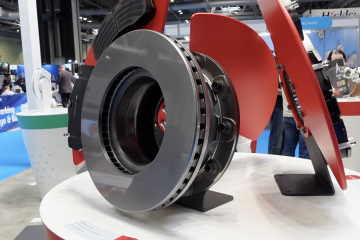The Autumn Statement, revealed by Chancellor Jeremy Hunt this week, has not included any specific provisions for the UK aftermarket, or the automotive industry in general.
Despite some expectations in the media, no mention was made of incentives or VAT cuts for electric vehicles and charging, while there was also no discussion around investment in training for the industry to ensure it remains up-to-date with the latest technologies.
Prior to the Autumn Statement, the Institute of the Motor Industry had published a wish list, calling for support with education, including increased funding for apprenticeships, support for businesses who made electric vehicle (EV) training investments on the back of the 2030 new-car petrol and diesel ban, which will now not see a return for an increased period, and for teaching motorists the road-safety aspects of ADAS.
None of these calls were heeded in the Autumn Statement, however. Some support was offered to small businesses with a freezing on the multiplier for another year, but the only offering for apprenticeship support was the announcement of £50 million to fund those in the ‘engineering and other key-growth sectors.” This is unlikely to include the aftermarket, despite the industry being crucial for the maintenance and repair of zero-emission vehicles.
Business support welcome
“There were some helpful announcements for garages and bodyshops in the Autumn Statement but also some missed opportunities,” commented Andy Hamilton, CEO at LKQ Euro Car Parts.
“We have long been vocal about the challenges they will face preparing their businesses for the future without government support, particularly in areas like the repair and maintenance of electric vehicles. So, the decision to make full expensing permanent is very welcome as it should allow them to offset at least part of their investment into the equipment needed to handle both EVs and ADAS-equipped vehicles.
“With the aftermarket facing a skills crisis we will always be supportive of more funding for apprenticeship places too. But the extra £50m announced today is specifically focussed on growth sectors and, though we areyet to see the detail on what these will be, it is not hard to imagine they will be the more hyped industries like tech and AI than our sector.
“Freezing the small business multiplier for business rates will help garages and bodyshops to keep costs under control so is of course welcome. But it feels like another chance has been missed to reform a rates system that continues to penalise bricks and mortar-based businesses, with the risk that the freeze could be lifted at the whim of whomever is the Chancellor next year.”
Autumn Statement is missed opportunity
James Lett, Technical Editor at Autodata, added: “Like many in the industry, we had high hopes that the Autumn Statement would recognise the critical investment and support needed in the transition to EVs. The expensive tools and widening skills gap to repair EVs is alarming, and without government support, garages and auto technicians are being left behind in the electric revolution.
“Whilst the ban on combustion engine vehicles has been extended to 2035, thousands of EVs are already on the roads and this will grow exponentially as manufacturers continue to pump an ever-increasing number of EVs into the market. But they can only be serviced or repaired by technicians with specialist training and tools. Neither of these are cheap nor there is no government investment to change that. Not only does this mean that garages are losing money by turning down business, but EV drivers cannot access the services they need to safely be on the road.
“Though the backbone of the automotive industry has been forgotten about in the Autumn Statement, I do hope that the message is being heard loud and clear at Downing Street. The EV revolution cannot happen until garages receive the support they need.”
More needed for apprenticeships
The announcement of funding for apprenticeships in engineering and ‘growth’ sectors in the Autumn Statement seems to bypass support for the automotive industry. Yet the increase in basic wages will require a recalculation of funding for businesses that are employing apprentices.
“We welcome the Government’s commitment to allocating a further £50m for a two-year apprenticeship pilot, exploring new ways to stimulate training in key growth sectors,” commented Martyn Rowley, Executive Director of the National Body Repairer Association (NBRA). “The repair sector, known for its role in social mobility, offers opportunities to people from all backgrounds.
“While we appreciate this as an initial step, we highlight the urgent need for comprehensive action in response to the industry’s unanimous plea for the reform or elimination of the Apprenticeship Levy. The absence of a direct response in the Autumn Statement is a missed opportunity, jeopardizing the development of a skilled workforce crucial to the repair sector. Currently, the industry faces a significant skills gap, creating a demand for fresh talent and new expertise.”
“The announcement of the National Living Wage increase is welcomed, but recognising the specific challenges faced by businesses in the automotive repair sector is crucial. The NBRA emphasizes the need for nuanced approaches to address wage concerns within the industry.”.
Rowley concluded: “As the Autumn Statement unfolds, we extend a call for collaborative efforts between the government and the automotive repair sector. We urgently appeal for the government’s support, providing essential relief for body shop employees navigating the escalating financial pressures during this challenging era of the cost-of-living crisis. Immediate action on apprenticeship reform, strategic support for workforce development, and targeted measures to enhance industry competitiveness are not mere suggestions but indispensable steps for securing the future of vehicle repairers.



